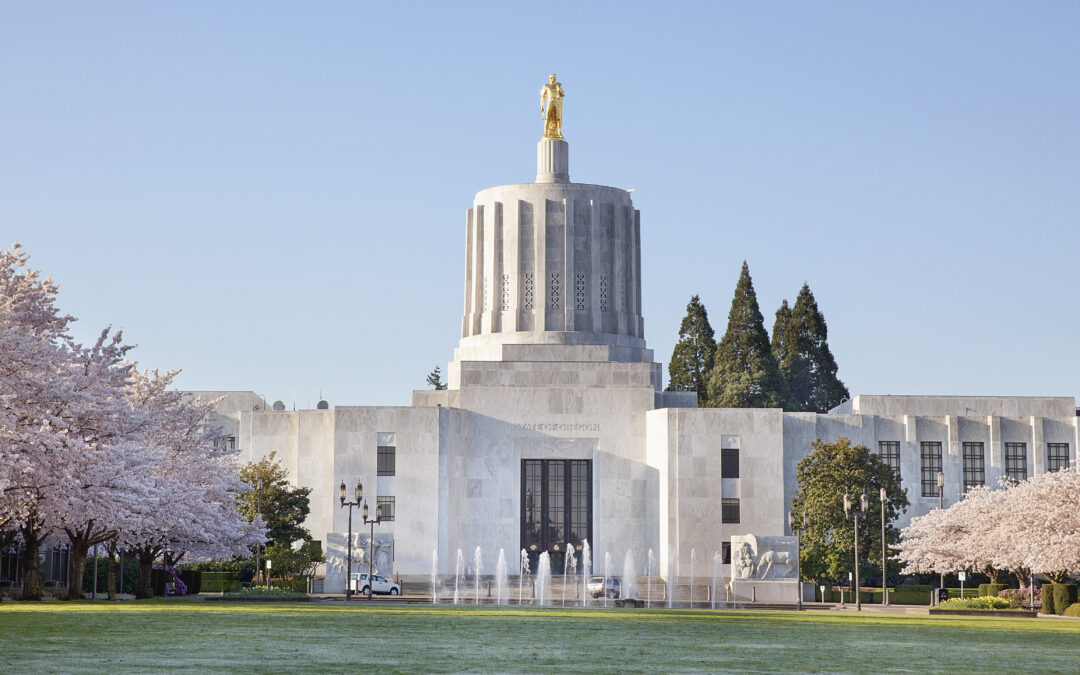
May 28, 2024 | AOC Advocacy, AOC News
The Association of Oregon Counties (AOC) policy steering committees and the Legislative Committee will meet June 17-18, in Salem, to consider and adopt the policy priority platform for Oregon’s 2025 legislative session. AOC’s priority policy items represent pressing issues with a strong nexus to county budgets, services, and functions that unite all Oregon counties.
Since the legislature adjourned sine die in March, AOC steering committees have met for nearly 40 hours of collective deep-dive information gathering and dialogue in preparation for the priority setting meetings. AOC steering committee co-chairs invited stakeholders, AOC affiliate and associate organizations, governor’s office representatives, and state agency directors and staff for presentations and in-depth Q&A sessions.
The AOC Legislative Committee adopts official positions on policy proposals, principles, and biennial priorities as recommended by AOC steering committees and thereby directs the legislative activities of the executive director and AOC legislative affairs team. Membership of the AOC Legislative Committee includes the AOC Board of Directors, one additional member from each of the eight AOC districts, the chair and vice chair of each AOC steering committee, one district attorney designated by the Oregon District Attorneys Association, and any additional members that the board of directors choose to appoint, such as a county not otherwise represented. Action is taken with 67% approval of voters present.
AOC steering committees analyze policy proposals, formulate policy solutions, discuss best practices, and advise the AOC legislative committee on policy positions, policy principles, and biennial priorities. Steering committees are co-chaired by county commissioners appointed every year by the AOC President and meetings are open to all AOC members. Every AOC member present at an AOC steering committee meeting can vote on action items and help shape AOC’s policy platform.
AOC steering committee recordings, agendas, and supplemental materials can be found on the AOC website within each policy portfolio:
Contributed by: Mallorie Roberts | Legislative Affairs Director

May 28, 2024 | News
Circular Action Alliance (CAA), the prospective producer responsibility organization for Oregon’s Recycling Modernization Act (RMA), announced the Oregon Recycling System Optimization Project (ORSOP) kick-off. The purpose of this project is to work with local governments and service providers to:
- Reconcile the proposed rule concept priorities with county and city requests;
- Coordinate city and county requests within counties;
- Highlight geographic considerations that need to be taken into account when scheduling investments; and
- Develop a process for incorporating both local government and related service provider feedback.
ORSOP is Phase II of the Local Government Needs Assessment Survey that was submitted by local governments in April 2023. Gathering the information is critical to ensuring that counties receive funding for the service expansion needs they identified in the April 2023 survey. Time is of the essence — there is no prioritization list for when local governments will be contacted by Resource Recycling Systems (RRS), and this work needs to be completed by July 2024. RRS has begun reaching out to local governments; now is the time to gather the information to prepare for the upcoming negotiations. With this information, CAA will be able to resubmit a revised program plan that outlines the local government system expansion and new program funding requests, and the schedule for funding those investments over the program plan period.
CAA has contracted with RRS to assist with ORSOP outreach to local governments and service providers over the coming months.
CAA has developed a suite of resources to prepare local governments and their service providers for engagement with RRS. These tools will aid in identifying the type of expansion and opportunities local governments and service providers may want to consider and to help them gather and organize the information that will be requested by RRS.
Contributed by: Jen Lewis-Goff | Legislative Affairs Manager

May 28, 2024 | News
In 2023, the Oregon Legislature passed HB 3630, which directed the Oregon Department of Energy (ODOE) to create a grant program to support Oregon counties with energy resilience planning. Specifically, HB 3630 provides up to $50,000 per county to develop an energy resilience plan.
The County Energy Resilience Grant Program provides grants to Oregon counties to develop energy resilience plans that:
- Map current energy infrastructure, natural hazard risks, and communities that experience social vulnerability.
- Identify needs to increase resilience.
- Identify steps for implementation.
- Receive input from environmental justice communities to identify communities that experience social vulnerabilities.
This is a noncompetitive grant program with no match requirement. All Oregon counties are eligible to receive funds provided they meet the eligibility requirements. Counties may also work together and pool funds in a cohort.
Opportunity Announcement
ODOE posted the Opportunity Announcement for funding on May 22, and is now accepting applications through Feb. 28, 2025. Applications should be sent to the program team via email.
Single County Application
County Cohort Application
Application Resources: FAQs | Plan Development Resources
Counties must submit the program completion form and a copy of their plans by Aug. 1, 2025. If a county already has an energy resilience or other type of energy plan, the funding can likely be used to update that plan as per the requirements of HB 3630.
Informational Webinar
Join ODOE for one of two informational webinars on June 6, and June 25, to learn more about the County Energy Resilience Program. Program details can be found here.
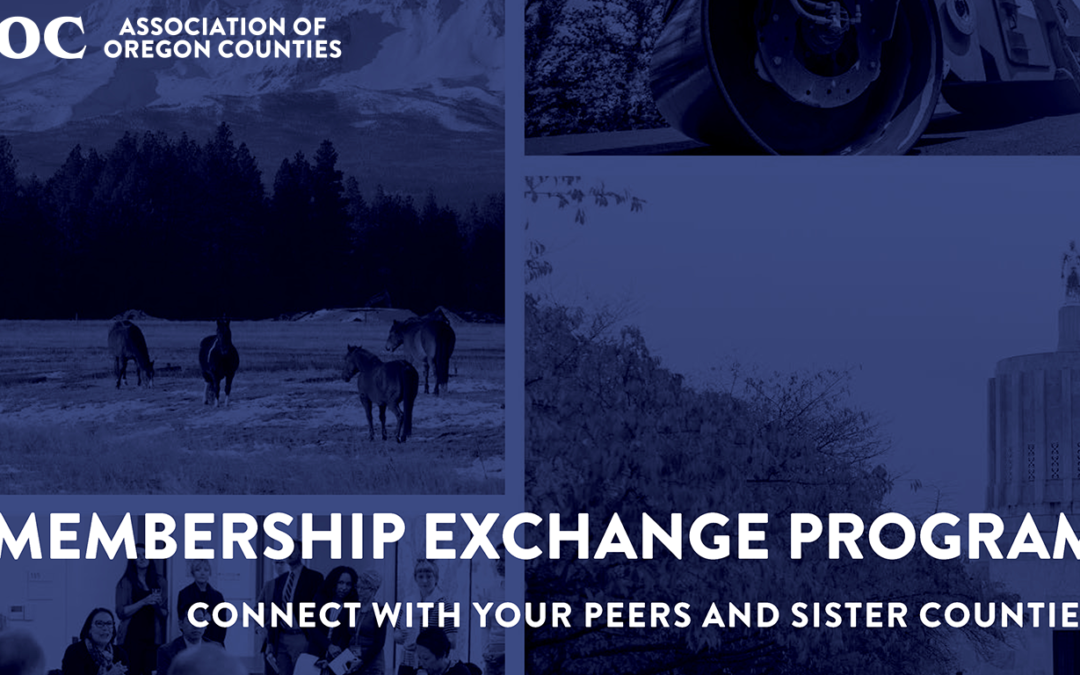
May 28, 2024 | AOC News
The Association of Oregon Counties (AOC) is excited to announce that applications will open for the 2024-25 AOC Membership Exchange Program on June 10.
The application process includes a quick, five-minute survey to help identify which counties you are interested in learning more about and what you hope to share about your county with your colleagues. Based on the application information, applicants will be placed in pairs or small groups and encouraged to plan county visits to get on-the-ground exposure to county successes, projects, and programs across diverse geographic regions and county structures.
Introduced in 2021 by the AOC Membership Committee, the AOC Membership Exchange Program was created to support AOC’s purpose to unite and advance county issues, foster trust in county government, and develop programs and services that support the success of counties into the future. Since inception, over 25 participants representing 20 counties, have planned exchange visits across the state.
Learn more about the program timeline on the program’s webpage. The application portal will open on Monday, June 10, and close on Friday, July 12, at 12 a.m. (midnight) PDT.
Contributed by: Kristen Paul | Member Services and Education Director
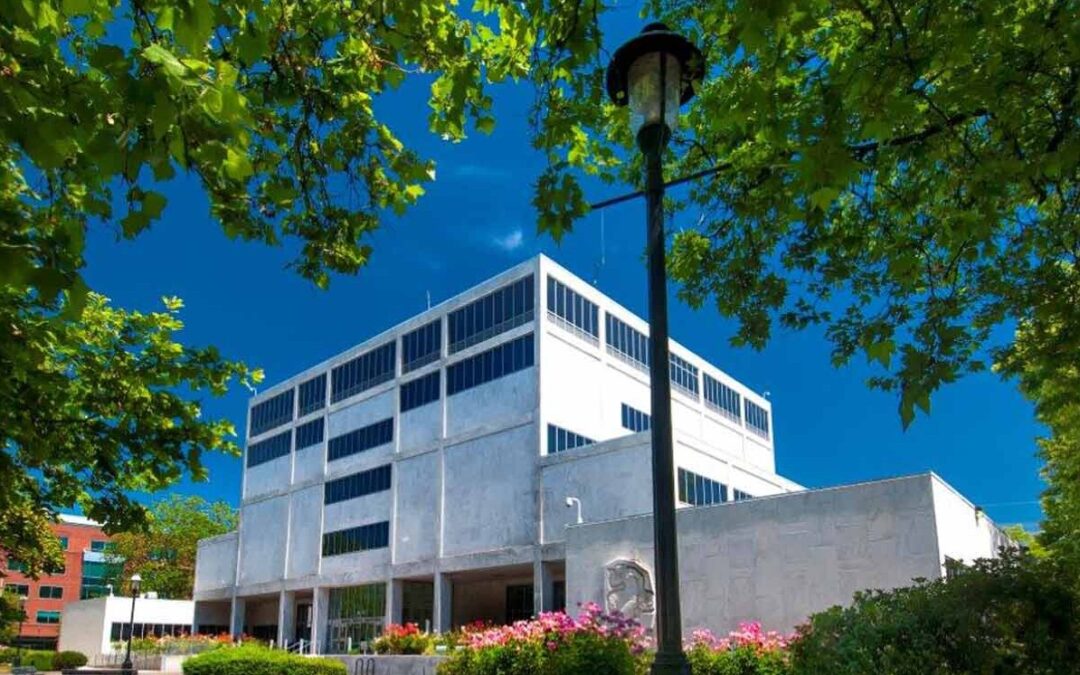
May 28, 2024 | County News
The Oregon Behavioral Health Deflection Program, established at the Oregon Criminal Justice Commission (CJC), is intended to re-establish local partnerships between law enforcement and the behavioral health safety net to effectively connect individuals to treatment and recovery while minimizing costly interactions with the justice system.
Twenty-three Oregon counties opted in to receive fast-tracked funding to stand up deflection programs, two of which applied as a consortium. While most counties are in the early planning stages, a few counties have been already assisting individuals facing mental health and addiction challenges through deflection programs.
AOC is running a series of articles in Oregon Trails to explore existing deflection initiatives, their successes, challenges, and how counties are preparing for the new drug related misdemeanor effective on Sept. 1.
Established in 2018, Marion County’s Law Enforcement Assisted Diversion (LEAD®) program provides community members access to services aimed at reducing recidivism. Based on the national LEAD® program model which started in Seattle, Marion County’s deflection program is initiated by either law enforcement in lieu of making an arrest, or through community referral based on an individual’s history of behavioral health conditions.
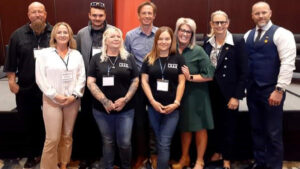 Residents in Marion County’s large rural areas often face challenges in accessing traditional services, including support for substance use disorders and mental health challenges. Local law enforcement officers in these rural areas, though well-acquainted with their communities, may not have the same resources as their urban counterparts. By collaborating with the LEAD® program, officers can link these residents to needed services. LEAD® Navigators work with officers to provide targeted outreach and integrate individuals into the program. Individuals are referred by law enforcement to LEAD® by arrest diversion, instead of making an arrest, or social referral based on history of behavior and conditions vetted by an informed group. The program offers 24/7 support, ensuring assistance is available across Marion County, filling gaps left by other programs.
Residents in Marion County’s large rural areas often face challenges in accessing traditional services, including support for substance use disorders and mental health challenges. Local law enforcement officers in these rural areas, though well-acquainted with their communities, may not have the same resources as their urban counterparts. By collaborating with the LEAD® program, officers can link these residents to needed services. LEAD® Navigators work with officers to provide targeted outreach and integrate individuals into the program. Individuals are referred by law enforcement to LEAD® by arrest diversion, instead of making an arrest, or social referral based on history of behavior and conditions vetted by an informed group. The program offers 24/7 support, ensuring assistance is available across Marion County, filling gaps left by other programs.
Eight other counties are exploring similar LEAD® programs for their communities — Baker, Clackamas, Clatsop, Columbia, Crook, Deschutes, Hood River/Wasco, and Lane counties.
On May 9, a HB 4002 Implementation and Training Symposium was held in Salem, sponsored by the Oregon District Attorneys Association, Oregon State Sheriffs’ Association, Oregon Association of Chiefs of Police, League of Oregon Cities, and the Department of Public Safety Standards and Training. Among other presenters, Marion County’s LEAD® Program provided in-depth training on their program to aid other counties considering developing their own deflection programs. View resources and videos of the symposium here.
Marion County’s LEAD® program collaborates with a wide range of partners, including public safety, health, and justice agencies, as well as organizations offering outreach, case management, housing, transportation, and treatment services. The collective efforts of these partners is essential for achieving long-term success.
According to the Marion LEAD® Program newsletter (November 2023), performance measures show that the program is making significant impacts (see table below).
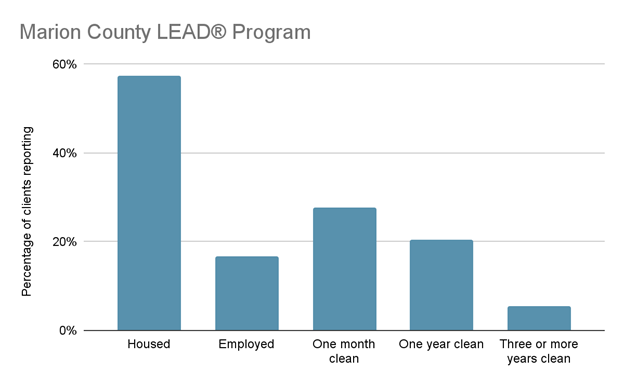
More recent data shared by Marion County show similar trends. Of the 19 clients in the first cohort (entered program in 2018-19) who participated in a follow-up assessment, 52.6% are housed, 47.4% are employed, and 47.4% report a good quality of life.
In anticipation of an increase of clients after Sept. 1, Marion County is planning to expand the LEAD® program by hiring additional staff. Currently, the program has three fully trained Navigators and one in training. An additional Navigator, as well as a management analyst is needed to manage the expected increased workload.
Marion County meets the large majority of the statutory requirements to access the deflection program grants through the CJC but will need to update their systems to the REDcap data collection software that the CJC is using for standardized implementation of the participating deflection programs. The program is also planning to reinstate its mobile crisis intervention teams, which were discontinued April 1, due to lost funding. The reinstated mobile crisis team will allow for law enforcement and a mental health clinician to co-respond to crises in the community.
Marion County, like all Oregon’s counties, play a critical role in connecting individuals to treatment and recovery through partner engagement and relationship building. AOC held a deflection program summit on March 18, to help county commissioners and local partners understand the CJC’s program requirements and timeline. The summit’s plenary and regional break-out session recordings and materials are available in the AOC archive.
AOC will convene the CJC, county commissioners, and local deflection partners as needed through the summer and fall to assist in program planning and implementation. Please contact Jessica Pratt or Jen Lewis-Goff to receive those meeting notifications.
Contributed by: Erin Good | Communications Coordinator







